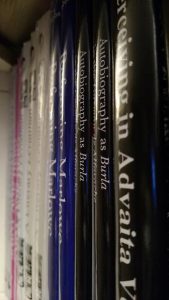For the past year at the Bucknell Press, three days a week I would enter the hobbit hole in the basement of Taylor Hall and be welcomed by rooms of books. Truly, the perfect place to work for any book lover. Not only to work among these shelves filled with texts, but to see a section of the history of the Press through its published works, ranging back to the early 1970s.
 When I first arrived at the Press, a yearlong project I was given was to scan all the books missing from the MLA bibliography from the past decade so they could be added to it. Exciting, I know. But as I looked through the shelves, it quickly became fascinating. I loved discovering the works reviewed, edited, discussed, and published here. From Monkey Farm by Donald Dewsbury to Editing Lives by Jesse G. Swan, each day at work brought new finds.
When I first arrived at the Press, a yearlong project I was given was to scan all the books missing from the MLA bibliography from the past decade so they could be added to it. Exciting, I know. But as I looked through the shelves, it quickly became fascinating. I loved discovering the works reviewed, edited, discussed, and published here. From Monkey Farm by Donald Dewsbury to Editing Lives by Jesse G. Swan, each day at work brought new finds.
Another project started through the Press was the creation of The Humanities Review, an academic journal for students. Part of the Bucknell Press internship is to create a project, and, as it was still early in the first semester I hadn’t considered what I would do. But one day, the director of the Press came to me with the idea to start a journal. To offer students a place to send in critical essays which would be reviewed by a board of their peers and hopefully published in an issue. As one aspect I’ve quite enjoyed at the Press is the board meetings where members decide which works to publish, to be able to help lead that process and to evaluate essays and publish them, is exciting. The process of evaluation, understanding what works and doesn’t, how this or that should be changed or added or taken out in the context of writing and words themselves, has always been a fascination of mine. It’s why I choose to work in publishing and wish to be an editor.
Part of my Press duties, as well, has been to write for the blog. Each month I got to choose a topic and look through the Press’s published books to find what fits within the theme. One of my favorites was definitely Monkey Day, both because who isn’t a fan of monkeys and it stood out as an oddity in the Press collection, but each month allowed another exploration into a topic where I, more often than not, didn’t know much of the history. And, again, I got to explore the past of the Bucknell Press while learning something new.
With a mother as a writer, I’ve grown up with an interest in publishing, although more the editorial rather than actual writing-a-book side. The past two summers I’ve interned for large companies in New York, working in genre fiction, and while I love those opportunities and will continue to go after them, neither had the intimacy of the smaller press that I’ve come to prefer. Walking into the office and personally knowing each of your colleagues is a treat hard to come by at a massive publisher.
Plus, throughout this year, my interest in academic publishing has grown tenfold. My first love will always be fiction because I love a good story, but I never looked at works of scholarship beyond using sources for my class essays. But now, understanding the process behind them, from both the authors and the publisher, I have a high appreciation for the texts as a whole, rather than a quote, and it definitely puts me in mind to read through a few on my own.
After my own lovely experience here at the Bucknell University Press, I wish next year’s student the same luck and happy internship.